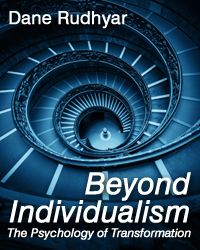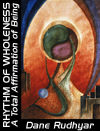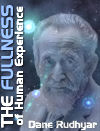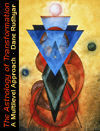Beyond Individualism
The Psychology of Transformation
by Dane Rudhyar
PART TWO:
THE SOCIAL-COLLECTIVE MODE
6. The Ideal of Social Plenitude
b. The Plenary Society
What I have written in the past (particularly in We Can Begin Again—Together, in 1970) concerning the possibility of a future state of global organization of mankind represents an attempt to deal with the actual psychological facts of human existence, and to do so unemotionally and without the prejudices inherited from over two centuries of Euro-American ideology. It is also an attempt to think of the organization of such a global society, not exclusively in terms of human factors, but also in relation to the basic telluric, climatic, and regional features of the entire globe—a 'geomorphic' (but not 'geopolitical'!) approach. I shall not deal here with the last point which I have hinted at in my book, Modern Man's Conflicts: The creative challenge of a global society.(1) All I can do here is to present a few basic principles, which are directly related to the ideas discussed in the preceding chapters of this book.
The concept of what I have called a plenary society rests upon the idea that a human being is an organized field of functional activities and that these activities manifest at four levels when fully operative (a relatively rare case at this time). A four-level type of functional activity tends to produce an equally fourfold kind of socio-cultural organization in order to meet the needs of different types or levels of human development, each type naturally seeking to emphasize in its own way of life one level of functions over another.
This differentiation of levels of functional activity should be considered a natural and thoroughly acceptable and justifiable tendency even in terms of socio-cultural organization. But—and this is an absolutely essential point—functional activity is not the only factor to be considered. As I have stated early in this book, wherever there are organized fields of activity there is also consciousness. This consciousness may exist in a diffuse state, belonging to the system-as-a-whole rather than to a particular exemplar; or it may be centralized and take the potential or only partially actualized and independent form of 'I-consciousness'. This I-consciousness characterizes the human state of individuality, and individuality implies at least a relative sense of responsibility and inner freedom of the 'will'—the individual's capacity to mobilize energy according to a conscious desire, intention or purpose.
Where individuality and the decision-making faculty exist, human life should be understood in two ways: in terms of centralized I-consciousness, and in terms of functional activity. Once the third order of functions (the individualizing functions) operates with some degree of efficacy in human beings, two realms of human existence have to be considered: the essentially subjective realm of individuality in which every individual is (in principle) unique and (at least potentially) self-determined because essentially 'free'; and the objective realm of functionality in which the activity of a particular person (body and psyche) is intrinsically related to the activities of whatever is active around him—whether it be other human beings, animals, plants or any other factor in the organic existence of the planet: air and atmospheric currents, rivers, sea, fields of magnetism or radiation, etc.
Unless these two realms of human existence are clearly differentiated—even though they evidently interact and interpenetrate at every point and at all times—no social system can harmoniously exist and fulfill all the needs of mankind. The basic problem, however, is how a society and its culture will be able (1) to define the boundaries, and especially the interactions between the two realms, and (2) to organize in a collectively efficient yet individually acceptable and fulfilling manner the various types of activities required for the harmonious and optimal operation of all human functions. These functions operate at the levels of matter, life, and mind; and their operation today cannot be considered truly and fully 'human' unless they allow for the development of the individualized consciousness in the best possible manner at any particular future stage of human evolution.
The plenary society I have envisioned is one in which, while spiritual equality indisputably and actually would be recognized as the fact of social existence, functional differentiation would also be the basis on which the society would be organized. And the entire system of social organization would have as its aim the welfare of the whole of humanity and the fulfillment of the essential purpose of human evolution on this planet.
The basic 'holarchic' principle implied here is that the fulfillment of the purpose of a whole under optimal conditions is more important than the welfare and happiness of the parts of that whole. But a part is also a whole containing many parts; and as a whole the fulfillment of its own nature and purpose is also essential. This holarchic principle implies therefore a relativism of values. The basic problem it poses arises from the need to reconcile—or more exactly, to harmonize and give a creative meaning to the relationship between—the two principles of holarchic organization.
The principle of 'individuality' and that of 'effective functional differentiation' would require almost inevitably a constant effort to harmonize as long as each individual participant in the whole life of humanity had not reached a full development of functions of the fourth order—thus the development not only of an unpossessive and all-encompassing kind of Christ-love and Buddha-compassion, but of the 'clear mind' that perceives the true relationship of every part of a whole to every other part, and also of the 'selfless will' that can operate only when such a 'cosmic' mind apprehends the 'Truth' (or dharma) of the whole. This is why, in my book, We can Begin Again—Together (Part Two, Chapter 8: "A Holarchic Approach to World Organization", pp. 141-174), I stressed the principle of a threefold pattern of social organization and the need to recognize, accept, and allow for the operation of three basic types of social functions, each of which calls for a natural type of human consciousness and operative ability.
Briefly said, there are human beings who, by nature and through their entire life-span, feel strongly attached to the land on which they were born and to the culture which molded their feeling and mental responses to life—and I see no reason to believe that this type of person, which today probably constitutes eight- or nine-tenths of the world's population, will disappear from the surface of the globe, at least not for the foreseeable future. I have spoken of such persons as regionalists, or as 'culture-men' (or women) whose natural capacities and life-goal are to produce—whether what is produced is food or products of various kinds. Their productive activity is most satisfactorily and happily performed when in harmonious relationship, on the one hand, with nature and its seasonal rhythms, and on the other, with a particular culture and its traditional manifestations. In the past, one thought of this type of human being mainly as peasants and artisans; but the type should include all those whose activities are deeply conditioned by local, racial, and ethnic characteristics. When deprived of their rootedness in a particular broadly geographical and socio-cultural environment —which also includes a particular form of traditional religion— these people actually become disoriented and live a disharmonic existence, as is the case today in our enormous and chaotic cities.
The other and contrasting type of human beings—the universalist or 'civilization-man' (or woman)—does not feel, or has overcome at a relatively early age, a strong or significant attachment to the particular region of his birth, or to his family, race, environment, and culture. The mind of these individuals carries the life-accent; they tend to be proud of, or at least strongly reliant upon, their own development and their intellectual and organizing capacities. They are the typical managers, organizers, promoters, and executives, at ease while dealing with relatively large and complex 'systems'.
They find their innate nature fulfilled in large-scale organization—and, at the conceptual level, with building new theories, or ever more inclusive systems of philosophy and religious interpretation. They are often hyperactive individuals, resentful of physical, earthly limitations; they tend to rebel impulsively against any kind of subservience to the requirements of strictly particular situations, and are often impatient with people whose visions and concerns are narrowly defined by biopsychic temperament and cultural tradition.Any plenary society should not only have recognized and accepted the co-existence of these two fundamental types of human beings, but should have become organized in such a way that the two types are able to fulfill their respective natures and capacities in a state of harmonious cooperation. This would require a basic understanding of the character and purpose of this natural two-level differentiation of human activity, leading to a 'live-and-let-live' attitude. It would necessitate the realization by all human beings that each function has its place and meaning in the harmonious workings of the whole society—which, in the future, would mean the whole of humanity.
However, it would be too unrealistic to believe that the two types would easily reach and maintain such a superpersonal and holistic understanding; and particularly that, while working together on specific problems of relationship among economic, social, or cultural factors—a relationship which each type naturally tends to interpret according to its own temperament—their decisions would not conflict. It is therefore evident that there will be a basic need for the exercise of a function to be performed by human beings best adapted to its requirements. These individuals would be the 'harmonizers'; they would naturally be found among individuals in whom the fourth order of functions would be developed—just as the universalist type of civilization-man would naturally refer to individuals in whom functions of the third order would greatly predominate, perhaps at the expense of functions of the first and second orders. It is impossible to definitely picture how these 'harmonizers' would operate, but they certainly would have to be closely involved in situations in which any potential conflict of interest between the two other types could be expected to arise.
In other words, the plenary society I envision would find a proper place and function for three essential types of human beings. It would accept functional differentiation as a basis for harmonious cooperation; yet it would also consider as fundamental the principle of spiritual equality—or to use a popular phrase, 'the worth and dignity of the human person'. Functional differentiation would imply the actual—and not merely theoretical and hypocritically proclaimed—'equality of opportunity' allowing every newborn to naturally and spontaneously discover the level of operation, and within that level the special function, which constitutes his or her dharma or 'truth of being'.
The Relative Failure of Western Society
Copyright © 1979 by Dane Rudhyar.
All Rights Reserved.
See Notices for full copyright statement and conditions of use.
Web design copyright © 2000-2004 by Michael R. Meyer.
All Rights Reserved.






